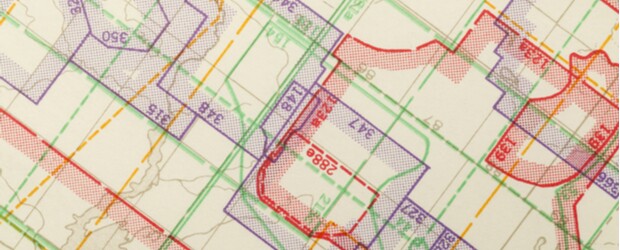Land is one of the most valuable assets, and one of the most tightly regulated resources, in the United States.1 Zoning and land use regulations determine how landowners can use their land. Recent decades have seen a marked rise in these regulations, increasing the demand for highly skilled, multitalented attorneys who succeed as negotiators, advocates, and advisors.
Growth in the field is just one of the reasons to pursue a career in land use and zoning law. Read on to explore the rich variety of work available to you in a specialty marked by important challenges and significant rewards.
Capitalize on the Numbers
“As governmental regulation increases in the areas of planning, zoning and land development, so does the need for public and private sector entities to employ sound legal counsel in achieving their land use objectives.”2 This statement, from the site of an international law firm with a deep bench of zoning and land use specialists, succinctly encapsulates the call for experts in a growing field of expanding complexity.
According to a leading professional recruiting site, the current median salary for land use attorneys in this country is just over $100,000, with 60% earning closer to $110,000 and the top 10% bringing home between $136,000-$156,000 each year.3
Choose Your Clients
Throughout your career, you may represent clients in the private and public sectors, including:
- Construction companies
- Corporations
- Environmental protection and advocacy entities
- Homebuilders
- Institutional investors
- Lenders and other financial institutions
- Local and municipal governments
- Private and public real estate developers
- Real estate agencies
- Residential, commercial, and institutional landowners
Many attorneys choose to work only for major developers, while others prefer to work exclusively in the private sector and with private homeowners.
Develop Strong Professional Contacts
This is a specialty for people who are good with people. Your strong interpersonal skills will be essential as you establish and build working relationships with government officials and staff, at every level, in support of effective advocacy for your clients' land use goals. You’ll also work with community and public interest groups and the media.
Your career will involve appearances before the multiple governing bodies that oversee environmental and land use issues. They include:
- State and federal agencies
- State planning commissions
- Administrative and judicial tribunals
- Local governments, comprised of:
- Boards of supervisors
- City councils
- Zoning boards
- Planning and redevelopment agencies
Use Your Many Talents
A successful career in land use and zoning law requires you to fire on all cylinders. Your clients will count on your skills in negotiation, analysis, strategy, and relationship-building, among others, as well as your comprehensive knowledge of multiple areas of law.
Among the diverse issues you may address, consider two as a starting point:
1. Constraints on urban and suburban land development are designed to realize multiple goals related to safety, aesthetics, and environmental care. Regulation, however, has reduced the supply of housing, including multifamily and low‐income units. With decreased supply, many American cities suffer from housing affordability problems.4
2. Regulation of the use of land and the activities that may be conducted on it significantly affects human health and the environment. With effective land use planning, for example, we can reduce urban sprawl, preserve green spaces, and limit soil erosion and contaminated surface water runoff. Those benefits notwithstanding, people often object to restrictions placed on use of their property, so land use law can be complicated and rife with conflict.5
As a specialist in this field, you’ll handle an immense breadth of challenges, including but certainly not limited to:
Strategic Services
Strategic planning is critical to success in handling land use issues. Your love for information will serve you well here, as you use your full knowledge of all levels of government law, real estate law, land use law, zoning law and procurement law to guide long-term plans, negotiate agreements, and structure finance transactions.
Land Use Approval
In these cases, you’ll help your clients obtain permits and other entitlements while building public support for their initiatives. They’ll rely on you to succeed in challenging adverse administrative actions and defending approved projects if they meet political or regulatory resistance.
Land Use Planning
You’ll work closely with local government officials to be sure that the land for real estate and development projects has the appropriate zoning and required permits and approvals. Your eye for detail will be important as you analyze local land development codes, zoning ordinances, development regulations and other restrictions and requirements to ensure that they do not conflict with a client’s proposed project.
These efforts will help you gain necessary government permits and zoning approvals. They also foster effective negotiation of development agreements, easements, licenses and other agreements required for project completion.
Environmental Regulation
Provide comprehensive strategies for clearing environmental hurdles before, during, and after development. This may include wetlands permitting, inspection and compliance reviews, Clean Air and Clean Water Act compliance and permits, and effective negotiation with state and federal agencies.
Land Use Development
Here, you’ll advise on land acquisitions, financing, renovation, and leasing … and that’s just the start. It will also be up to you to secure zoning, rezoning, site plan, special land use, and sign approvals; see to compliance with environmental, wetlands, and water rights regulations; successfully negotiate access, utility, conservation, and reciprocal easements; prepare agreements for site development, farmland development, and operation; and provide guidance on green building, wind rights, oil and gas, and mineral rights.
Land Use Follow-Through
Come to the table prepared to negotiate development agreements successfully, in order to secure necessary entitlements, permits and land use designations for clients’ projects. You’ll prepare development pacts with local redevelopment agencies to secure municipal financing and long-term development rights. If unique local or regional statutes have bearing here, you’ll need to know how to apply them. When zoning approval is in place, you’ll prepare reciprocal easement agreements, operating covenants and other commercial and residential development documents to facilitate project completion.
You Love a Challenge. Prepare to Conquer Many of Them.
Hone your expertise. The Tulane University online Master of Jurisprudence in Environmental Law and in Energy Law programs set you up to succeed in navigating increasingly complex local, state, and federal regulations.
In our career-enriching programs, you’ll study with world-class legal experts and complete your studies entirely online. Make your first move toward an accomplished legal career. Reach out to an Admissions Advisor today.
- Retrieved on September 24, 2021, from dcpolicycenter.org/publications/economic-cost-land-use/
- Retrieved on September 24, 2021, from hklaw.com/en/services/practices/real-estate-hospitality-and-leisure/land-use-and-government
- Retrieved on September 24, 2021, from ziprecruiter.com/Jobs/Land-Use-Attorney?
- Retrieved on September 24, 2021, from cato.org/policy-analysis/zoning-land-use-planning-housing-affordability
- Retrieved on September 23, 2021, from eli.org/keywords/land-use


